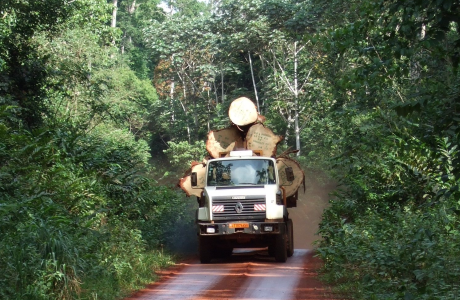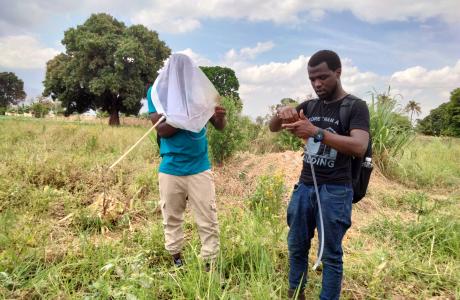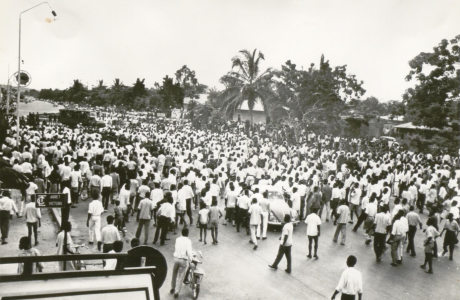AfricaMuseum backs recommendation for the unconditional repatriation of human remains in colonial collections
AfricaMuseum was one of seven partners of HOME, a research project on human remains in Belgian collections. Its objectives were to investigate the historical, scientific and ethical contexts surrounding these human remains, and inform and engage political and societal stakeholders in DR Congo and Belgium on their possible outcomes. This article presents the contributions of the AfricaMuseum as well as the conclusions drawn within the framework of the HOME project.

Words have meanings
While the term ‘human remains’ is used here and in the documentation for the HOME project, a discussion with different stakeholders in DR Congo and Belgium is necessary to arrive at a more appropriate expression.
A press release in French sent on 8 November 2022 by activists from Belgian and Congolese civil society referred to the ‘dépouilles des ancêtres’ (literally, ‘remains of ancestors’.)
Meanwhile, Prof. Donatien Dibwe dia Mwembu has suggested the term ‘dépouilles des anciens’ (‘remains of elders’) as a workaround for issues surrounding cultural and biological kinship.
In DRC, stakeholders have made reference to ‘ancestors’, ‘ancestral remains’, and ‘human remains’.
In-depth research
AfricaMuseum researchers have studied the archives of the historical collection belonging to the former department of anatomical anthropology, also known as the ‘AA collection’ of physical anthropology at AfricaMuseum.
More than 98% of the human remains in the AA collection are from DR Congo.
The violent history of the skulls of Chief Lusinga Iwa Ng'ombe, Prince Kapampa, and Chief Maribou had already been the subject of several studies and publications prior to the launch of the HOME project.
But project researchers combed through the AA collection and also found the names ‘Bene’, ‘Amakeo’ and ‘Apayembe’ from Ituri and the chiefs ‘Bikitiki’ and ‘Memili’ from Uele. It will be possible to verify if these names were noted accurately and in full by collaborating with Congolese researchers and including oral tradition in the investigation.
When the physical anthropology department of the museum was shut down in 1964, the skulls and other human remains conserved in the AA collection were transferred to the Royal Belgian Institute of Natural Sciences, where they remain to this day.
But researchers discovered that the transfer was in fact incomplete, and that the skull of Prince Kampapa and other human remains had remained in the AfricaMuseum’s Biology department.
Finally, a review of the AA collection register showed that these ‘collections’ of human remains were heavily influenced by racist thought in Belgium. HOME project promoter Maarten Couttenier has published several studies on this topic.
Case study : The ‘Van den Ginste collection’
Shortly after the Second World Ward, a colonial territorial agent named Ferdinand Van de Ginste desecrated more than 200 graves, managing to collect 187 skulls from the Suku communities in Feshi (in Kwango province, some 700 km from Kinshasa) for anthropometric research. This sub-collection accounts for over a third of the AA collection today.
As part of HOME, researcher Lies Busselen and anthropologist Placide Mumbembele travelled to Feshi to meet with people who could, through oral tradition, recount this story from a Congolese perspective. An article in ReMaking Collections (2023) discusses the case in greater detail.
Informing and collaborating
In 2021, AfricaMuseum researchers had an initial meeting with representatives of Congolese diaspora associations to report their findings to a wider audience, set up collaborations in DR Congo, and open dialogue between Congolese and Belgian stakeholders.
Lies Busselen contextualized the inventory and provided several examples from the AA collection, with an emphasis on the Feshi case study.
Suzanne Monkasa (Plateforme des Femmes de la Diaspora Congolaise de Belgique) shared her recommendations with the institutional partners of the HOME project.
Project partners Collectif Faire-part and Waza art centre led in-depth discussions in Kinshasa and Lubumbashi on Congolese human remains in colonial collections. These were attended by nearly 50 descendants, representatives, artists, conservators, historians, anthropologists, museum and heritage experts, local and national politicians, and other stakeholders.
AfricaMuseum also collaborated with the Institut des Musées Nationaux du Congo (IMNC) for a national workshop, ‘Restitution des restes humains. Pour une réhumanisation des collections’ organized in Kinshasa on 30 March 2022. More than 30 distinguished Congolese participants took part in the workshop to discuss the repatriation of human remains in the Congolese context.
In November 2022, Waza and Collectif Faire-part were invited to Belgium, where they supported two commemorative events on 1 November and 11 November, with Georgine Dibua of asbl Bakushinta and Dido Lakama of Change asbl. On 5 November, a projection of the discussions led in DR Congo by Waza and Collectif Faire-part on the repatriation of human remains was organized in collaboration with the Belgian NGO Coopération Éducation et Culture (CEC). The premiere was capped by a lively debate between the audience and the directors of Waza and Collectif Faire-part.
Lessons learned from the HOME project
Human remains in colonial collections go to the heart of human dignity. As a Federal Scientific Establishment, AfricaMuseum supports the recommendation to unconditionally repatriate such remains, once bilateral consultations have been conducted.
Collaboration and dialogue between stakeholders in Belgium and DR Congo, involving policymakers, experts, academics, and source communities, are essential. AfricaMuseum, the Institut des Musées nationaux du Congo, and universities in DR Congo are working on an equal footing.
The HOME project reflects the need to conduct historical and anthropological provenance research in both DR Congo and Belgium to reckon with our colonial past.
Funded by Belgian Federal Science Policy (BELSPO) for the 2020-2022 period, the HOME project was led by the Royal Belgian Institute of Natural Sciences, in collaboration with the National Institute of Criminalistics and Criminology, the Royal Museums of Art and History, Université libre de Bruxelles, Université Saint-Louis, Université de Montréal, and AfricaMuseum.


